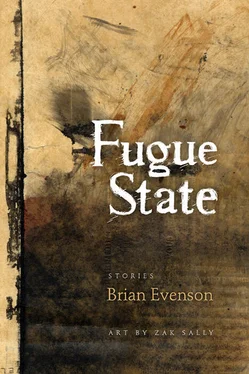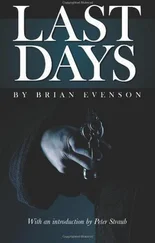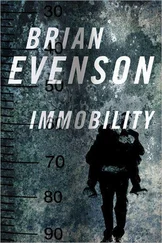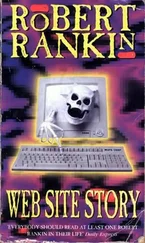When I awoke, it was on a large vessel. Delirious at first, I thought myself back on the ship where I had begun, and had I the strength, I would have thrown myself overboard. But no, it was a ship like any other, bustling with men by day and night, and once they realized I was coherent they brought me a few thimblefuls of water and the smallest crust of bread. I must eat slowly, they told me, and not much; after my ordeal I must slowly and gradually learn to eat again.
They gave me a little more each day, and slowly I began to recover, to feel more and more human. Soon, I was told, I would be able to leave my bed. It was amazing, claimed the captain, a man without a lantern in his hand or even within reach, that I had survived, a man of my age. Of my age? I wondered, and then took the tin cup that the captain held out to me and drank it slowly dry. The captain, a man of ruddy complexion and questionable accent, stayed at my bedside, watching me.
“There is only one thing,” he said, hesitantly.
“I am happy to pay for my passage,” I said quickly, thinking of the ring I had had from killing Kuylers, the ring he would have gladly given me and had offered me many times before.
“No,” he said, ducking his head, “a man adrift, he does not pay. It is not this.”
“Then what?” I asked.
“This boat,” he said. “Where did you find it?”
“The boat?”
“This lifeboat,” he said. “This is registered to a ship that fell to the winds and went down many years past.”
I opened my mouth and shut it again, not knowing how to respond. Nor did I know how to respond to the questions that followed, nor how to think about the ship I had found myself, under false pretenses, aboard for several days. And, as over the next few weeks the questions kept coming, I felt increasingly the necessity to leave them unanswered, to do what I could to avoid the yawning space they opened up before me.
But what I could not avoid came on my first day afoot, as I abandoned my bed and stumbled my way down the passage, razor in hand, to shave myself for the first time in many days, and found myself seeing, in the burnished zinc panel that served as a mirror, not my own reflection but that of Alfons Kuylers. Was it any surprise that seeing this I would opt to use the razor not to strip away the beard and thus reveal Kuylers all the more but rather instead to open Kuylers’s wrists?
It is only now, still days from port, wrists bandaged, restrained in my bed, fighting madness, avoided by the crew, days after attempting what was not so much suicide as an attempt, responding to the look on his face, to kill Kuylers yet again, that I begin to understand what a fitting fate this is, how it springs naturally from the philosophico-religious discussions I shared with my mentor both while he was alive and, once in a lifeboat, after his death. What, I have asked myself again and again, remains for me if not to become Kuylers wholeheartedly, to return to my former city, to resume my trade in imported goods, to continue to read, to study? Until the day when a young student appears and begs me to serve as his mentor and I teach him slowly, preparing him carefully for the moment when he will see astonishment mingled with fear in my face and know he has been condemned to kill me. And by so doing he will enter into the trap that will strip him of his own name and leave him bereft and adrift. It is a fate neither of us can avoid.
But isn’t this simply, Kuylers suggests later, trying to console me or provoke me, the trap everyone falls into sooner or later? And understanding this, shouldn’t we simply accept our fate?
But I do not respond. Instead, I test yet again the strength of my restraints. Surely they cannot be strong enough to hold me forever.
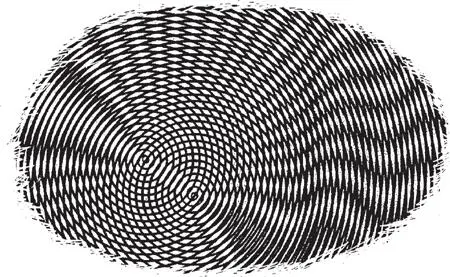
— for Arnaud and Claro
I.
I had, Bentham claimed, fallen into a sort of fugue state, in which the world moved past me more and more rapidly, a kind of blur englobing me at every instant. And yet he had never, so he confided to Arnaud, felt either disoriented or confused. Yes, admittedly, during this period he had no clear idea of his own name, yet despite this he felt he understood things clearly for the first time. He perceived the world in a different way, at a speed that allowed him to ignore the nonessential — such as names or, rather, such as his own name — and to perceive things he could never before have even imagined.
Arnaud listened carefully. Fugue state, he recorded, then removed his eyeglasses and placed them on the desk in front of him. He looked up, squinting.
“And do you remember your name now?” he asked.
At first, Bentham did not answer. Arnaud remained patient. He watched Bentham’s blurred image glance about itself, searching for some clue.
“Yes,” said Bentham finally. “Of course I do.”
“Will you please tell it to me?” asked Arnaud.
“Why do you need to know?”
Arnaud rubbed his eyes. Subject does not know own name, he recorded.
“Will you please describe the room you’re in?” he asked. Bentham instead tried to sit up, was prevented by the straps. Subject unaware of surroundings, Arnaud noted. “Will you describe your room, please?” asked Arnaud again.
“I don’t see the point,” said Bentham, his voice rising. “You’re here. You’re in it. You can see it just as well as I can.”
Arnaud leaned forward until his lips were nearly touching the microphone. “But that’s just it, Bentham,” he said softly. “I’m not in the room with you at all.”
It was shortly after this that Bentham began to bleed from the eyes. This was not a response Arnaud had been trained to expect. Indeed, at first, his glasses still on the desk before him, Arnaud was convinced it was a trick of the light, an oddly cast shadow. He polished his glasses against his shirtfront and hooked them back over his ears, and only then was he certain that each of Bentham’s sockets was pooling with blood. Startled, he must have exclaimed, for Bentham turned his head slightly in the direction of the intercom speaker. The blood in one eye slopped against the bridge of his nose. The blood in the other spilled down his cheek, gathering in the whorl of his ear.
6:13, Arnaud wrote. Subject has begun to bleed from eyes.
“Bentham,” Arnaud asked, “how do you feel?”
“Fine,” said Bentham. “I feel fine. Why?”
6:14, Arnaud recorded. Subject feels fine. Then added, Is bleeding from eyes.
Picking up the telephone, he depressed the call button.
“I need an outside line,” said Arnaud when the operator picked up.
“You know the rules,” said the operator. “No outside line during session with subject.”
Blood, too, Arnaud noticed, had started to drip from Bentham’s nose. Perhaps it was coming from his ears as well. Though with Bentham’s visible ear already puddled with the blood from his eye, it was difficult to be certain.
“The subject appears to be dying,” said Arnaud.
“Dying?” said the operator. “Of what?”
“Of bleeding,” said Arnaud.
“I see,” said the operator. “Please hold the line.”
The operator exchanged himself with a low and staticky Muzak. Arnaud, holding the receiver against his ear, watched Bentham. It was a song he felt he should recognize but he could not quite grasp what it was. Bentham tried to sit up again, straining against the straps as if unaware of them, without any hint of panic. In general he seemed unaware of what was happening to him. A bloody flux was spilling out of his mouth now as well, Arnaud noticed. He groped for a pen to record this, but could not find one.
Читать дальше
